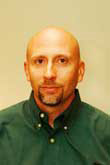Pat Tillman was a stellar athlete who succeeded in college and rose to unique status in the NFL, where he did a very un-American thing, stepped away from a multi-million dollar contract, to do a very American thing, enlist in the military after 9/11 in order to serve his country. The news and political stories of Tillman's decision played down the apparent rejection of materialism in Tillman's volunteering to serve in the military, but the official stories began to craft a narrative starring Pat Tillman as Captain America.
Apparently, we could mask a not-so-subtle challenge to our materialistic existence and consumer culture as long as that masked hero would justify our wars.
Then Tillman died in the line of duty.
Then the U.S.
government was exposed for building a story around Tillman's death that was
untrue: Pat was killed by "friendly fire" (a disarming term for an
incomprehensible and gruesome fact of wars) and not at the hands of the enemy
as officials initially claimed--to Pat's brother who was also serving and
nearby, to Pat's family, and to the entire country.
Beyond the continuing chasm between the real life and death of Pat Tillman and the narratives created around him, the release of the documentary presents the American public with a story that isn't very flattering. The Tillman Story depends on the ambiguous meaning of "story," as a synonym for "narrative" and "lie," to offer another layer to the growing truths and distortions connected with why Pat Tillman joined the military, how he died, and the complex human being who he was.
Now, if we place the Tillman stories against the ongoing debate in the military over "don't ask, don't tell," we notice that in this culture we endorse masking reality as a good and even honorable thing. We confront the Great American Myth that never allows us to ask, much less tell.
This military policy based on deception is ironically our central cultural narrative, one the ruling elite perpetuates as political success depends upon speaking to our cultural myths instead of to reality. We are a country committed to don't ask, don't tell.
Pat Tillman's life story and the corrupted narrative invented by politicians and the military to hide the truth and propagandize at the expense of a man and his life are tragic and personal myths that we are ignoring still. If the ruling elite will fabricate preferred stories at the expense of a single person, we can expect the same about the institutions central to our democracy, such as our public education system and teachers.
Such is a
disturbing confirmation of the "myths that deform" that Paulo Freire cautioned about in his examination of the failures
of "banking" concepts of education.
In this new era
of hope and change, the Obama administration, we must be diligent to ask and
tell, especially when it comes to our public schools. The false dichotomy of
Republican and Democrat, conservative and liberal, is a distraction from the
reality of the political elites expressing corporatist narratives to ensure the
balance of power favoring the status quo. Leaders are often compelled to
maintain cultural myths because black and white messages are politically
effective.
President Obama and Secretary of Education Duncan are now leading a renewed assault on public education, and indirectly teachers, under the banner of civil rights--just as Pat Tillman's life and death were buried beneath claims of patriotism raised like Captain America's shield so no one could see behind it.
The reality that
Obama and Duncan cannot ask or tell about is poverty--and its impact on
the lives and learning of children. Acknowledging poverty is an affront to the
American Dream; confronting poverty is political dynamite. Blaming teachers and
schools instead without offering the evidence works because this is a message
we are willing to acknowledge and hear.
Recently, a
group from the ruling elite of schools, self-described as "educators,
superintendents, chief executives and chancellors responsible for educating
nearly 2 1/2 million students in America," placed themselves squarely in
the context of President Obama's and Secretary Duncan's charge against teachers
and the status quo; their manifesto states: "As President Obama has
emphasized, the single most important factor determining whether students
succeed in school is not the color of their skin or their ZIP code or even their
parents' income--it is the quality of their teacher."
The names of the
leaders--Klein, Rhee, Vallas --are
impressive, and their sweeping claims are compelling--except that the
substance of their message is false.
Narratives are powerful, and telling those narratives requires diligence, a willingness to say something often enough to make the created story sound more credible than reality--until the truth is masked beneath a web of narratives that makes truth harder to accept than the lies that seem to conform to all the myths that deform us (rugged individualism, pulling oneself up by the bootstrap, a rising tide lifts all boats).
(Note: You can view every article as one long page if you sign up as an Advocate Member, or higher).





